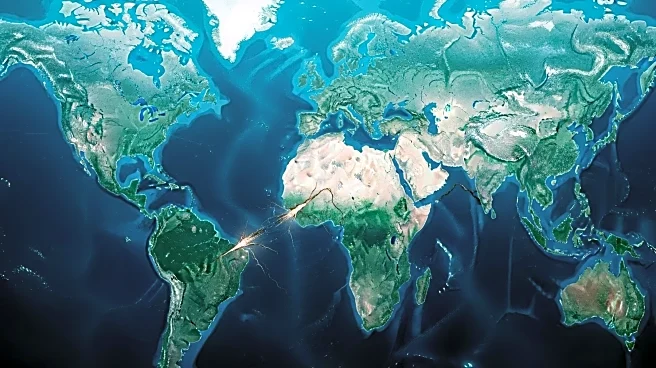What is the story about?
What's Happening?
Undersea cables in the Red Sea have been cut, leading to significant disruptions in internet access across parts of Asia and the Middle East. The incident has raised concerns about potential targeting by Yemen's Houthi rebels, who have been involved in a campaign to pressure Israel amid the ongoing conflict in Gaza. Despite these concerns, the Houthis have denied responsibility for the attacks. The subsea cables are crucial for global internet connectivity, and their damage can lead to slower internet speeds as service providers reroute traffic. Microsoft has reported increased latency in the Middle East due to these fiber cuts, while NetBlocks has confirmed outages affecting multiple countries, including India and Pakistan. The affected cable systems are managed by Tata Communications and Alcatel Submarine Networks, though neither company has commented on the situation.
Why It's Important?
The disruption of undersea cables highlights the vulnerability of global internet infrastructure to geopolitical conflicts and targeted attacks. These cables are essential for maintaining stable internet connectivity, and their damage can have widespread economic and social impacts. Countries affected by the outages may experience slowed communication and business operations, potentially affecting economic activities and international relations. The incident underscores the need for robust cybersecurity measures and infrastructure resilience to protect against such disruptions. Additionally, the geopolitical tensions involving the Houthis, Israel, and other regional players could further complicate diplomatic efforts and exacerbate existing conflicts.
What's Next?
Repairing the damaged cables could take weeks, as specialized ships and crews are required to locate and fix the issues. During this period, affected regions may continue to experience internet disruptions. The ongoing conflict involving the Houthis and Israel may influence further developments, including potential ceasefires or escalations. International stakeholders, including governments and telecommunications companies, may need to collaborate on enhancing the security and resilience of undersea cable networks to prevent future incidents.
Beyond the Headlines
The cutting of undersea cables not only affects internet connectivity but also raises ethical and legal questions regarding the targeting of civilian infrastructure in conflicts. Such actions can be seen as violations of international law and may lead to increased scrutiny and condemnation from the global community. The incident also highlights the strategic importance of undersea cables in modern warfare and diplomacy, as they are critical assets for communication and information exchange.
















